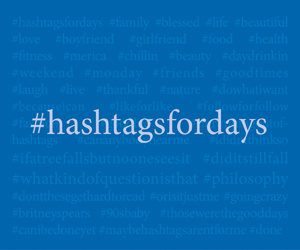So unless you’ve been in some sort of astronaut space sleep / coma for an extended period of time, we have this thing called a hashtag now. My father, for instance, still likes to pronounce it as “pound.” I am pound blessed to have a father like him.
It’s peculiar, yet extremely useful in some ways for PR professionals and advertisers. It has, in many ways, even lost it’s meaning as we see a simple photo of, let’s say, a sunset. Said sunset is then captioned with the following (and this is an actual example from someone who shant be named): #sun #set #orange #yellow #colors #livinlife #blessed #fridaynight #chillen #drinkingmargs #notreally #drinkingmojitos #beach #sand #fun #family #friends #summer #notreallysummersnothereyet #eatingmyfaceoff #conchfritters #beautiful #beauty
There’s more. I just couldn’t bring myself to physically type them all.
If you are totally lost, a hashtag is a way to index a subject a user is referring to so that it can be accessed by other users and sorted into that specific category. No spaces are required for hashtags and no punctuation is needed. These will often be used for special events. For instance, you’ll see the Super Bowl come out with a specific hashtag or you’ll see an ad campaign launch nudging people to use the hashtag. You’ll want to be specific when using hashtags as well. For instance #family isn’t a particularly effective hashtag because it is too broad. #TheAdamsFamily or #FamilyFeud? You’re getting there.
Hashtags are in full force on Twitter and Instagram, and besides for the aforementioned problem of the overuse, they are looking pretty solid.
So then comes the black sheep of hashtags yet the Golden Goose of the social media world: Facebook.
Use them? Don’t use them? You’ll never get a straight answer on this debate. My advice for other marketers out there, and for people interested in self-branding, is to not use them.
They can make your post clunky and they aren’t particularly effective on Facebook even with the security settings of everyone’s profiles being a dime a dozen for what they are and aren’t showing. Hashtags, sure, can make your content visible to a wide audience, but Facebook, at this point, is like the stuffed animal you had in fifth grade. Yeah, you kind of still have it way past its due date, but it holds a bunch of memories, is somewhat sad to get rid of and (circa my photos from 2009) is really, really embarrassing to show to your friends.
As the dying modem for conversation among young people, what’s the point in trying to create more engagement with hashtags? Some may disagree, but I stand by my point.
In a study of top brands on social media by SproutSocial, interactions dropped abruptly for brands using three to five hashtags in a post – and fell steeply from that for each hashtag there after.
Now in some cases, Facebook campaigns with hashtags can be extremely successful, but that is mostly when those hashtags are taken cross-platform. For instance, the Dove #Beautyis campaign was a very widely used (and brilliant might I add) campaign. They’ve since moved the to #speakbeautiful where women are encouraged to say something nice about themselves every day, whether through a photo or just a simple tweet.
I’d also like to bring exhibit B to your attention: top-branded news(?) outlets like Mashable, Buzzfeed and The Daily Beast. You will rarely, if ever in extreme cases like events or a specific campaign, see those outlets use hashtags on their Facebook pages. It’s a link and a quick pull quote or just something to grab your eye. That’s what the secret formula is now-adays.
Go forth and use your hashtags on Instagram and Twitter, just please, keep them out of my Facebook that I don’t even check.


Comments are closed.